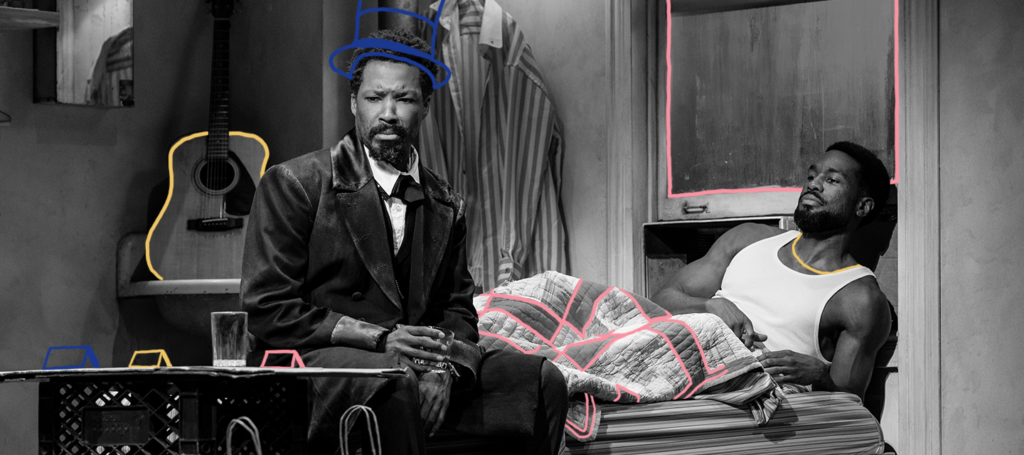


A Blazing Romp Through America’s Dog-Eat-Dog Butchery
Suzan-Lori Parks’ Pulitzer Prize-winning love letter to hustlers returns to Broadway in a powerful production. Although Topdog/Underdog premiered off-Broadway in a pre-9/11 United States, under Kenny Leon’s direction, this revival makes it look as if it were tailor-made for the era of betrayal and dissension we live in today.
The play, set in Giuliani-era New York City, follows two Black adult brothers who are living together in poverty, sharing a single-room residency. For work, Lincoln (Corey Hawkins in a sensational star turn) dresses up in whiteface every day to impersonate President Lincoln at an arcade, where he is shot and re-assassinated by customers for fun.
His younger brother Booth (Yahya Abdul-Mateen II delivering a dazzlingly nuanced debut) spends his days stealing assorted luxury goods, fantasizing about reuniting with his former girlfriend Grace, and practicing a three-card Monte, in imitation of Lincoln who was once an acclaimed scammer in his own right.
As teenagers, the siblings were abandoned by their parents who left each of them a $500 inheritance. After spending his inheritance and being kicked out of his home by his wife, Lincoln pays an otherwise unemployed Booth to crash with him. But Booth has ambitions. He wants his brother to mentor him as a card shark in order to return to the streets for some real money. Lincoln simply wants to keep his job and sit for a while in peace and certainty―even if that means enduring the trauma of faux murder multiple times a day.
The meta-textual symbolism in Park’s work oozes out of every sentence. One major theme that leads this revival is entitlement resentment, which makes a perfect comment on the post-January 6 United States and the mostly white MAGA acolytes who stormed the Capitol―because they feared that their historically marginalized fellow citizens were asking for an equal stake to their stolen birthright.
In this instance, much like the historical John Wilkes Booth, Topdog/Underdog’s Booth is the insurgent, and our Black Lincoln echoes the historical Lincoln in selling him out by refusing to enable his antics. Familial familiarity breeds contempt at the best of times, but in this tenuous situation, the prospects are so bleak that it feels as if the entire stage might detonate at any moment.
Fortunately, Leon directs the play at a slow simmer, actualizes the words, and keeps the pressure in a constant state of ebb and flow. His production design partners go a long way in helping to maintain that tight calibration. Dede Ayite’s fantastic costumes conjure the bold fashions of late ‘90s New York―particularly her suits for the two brothers. Arnulfo Maldonado’s scenic design ably captures the tight, desiccated look of many SROs, and his golden, star-spangled banner-themed curtain is a masterpiece. Meanwhile, Allen Lee Hughes’ lighting design and Justin Ellington’s sound design make one feel as if they are part of the action rather than simply watching it unfurl. Wonderful as those elements are, even if the play were staged in an empty parking lot, Abdul-Mateen’s and Hawkins’ performances would score.
Though cursed with reckless-mouth syndrome and given to antagonizing Lincoln by reminding him of who he used to be―and that he slept with his former wife―Abdul-Mateen II plays the character with a jovial and exciting physical bluster; as if he might say, “just kidding” after every taunt, even though he never does. It is a radical reinterpretation of this part, which many Black theatre students across the world have idolized and committed to memory. This Booth is not just slick, he’s the best friend and hype man you’d want in your life, if you both shared the same objective.
That Lincoln does not, makes one wary that Booth might suddenly plunge a blade through his eye. It also transforms the play’s final moment into a tragedy when Abdul-Mateen II shows the wounded inner child who will do anything to maintain his sense of fairness. At the performance I attended, while brilliant throughout, he didn’t entirely manage that transformation because I felt that he was trying to work himself into tears―and pushing towards a projected result―rather than allowing whatever turmoil he was feeling at the time to carry through. I imagine Abdul-Mateen II has already resolved this sequencing issue.
There is no such concern for process with Hawkins’ masterfully weary performance. He embodies Lincoln as a slumbering lion who finally rears his head to show that he could have seized control of the entire situation at any time―much like the lead scammer of a Three-card hustle. But that reading flattens out Lincoln’s motivations, which are never as clear as Booth’s. Unlike Booth, who constantly tells us what he wants, Lincoln maintains the mystery. However, Hawkins lays it out during a phenomenal vocal and acoustic guitar performance that made my panties wet. Instead of getting caught up in the dog-eat-dog butchery of deciding who’s on top in this American life, he just wants to be for a while.
What adds depth to Hawkins’ Lincoln is that he shows us that he stays with his brother because he wants to be with the only family he knows. His Lincoln loves this Booth, even though he can’t give him what he wants. It’s clear that he could make other arrangements, but he remains in the uncomfortably cramped quarters because beneath the contempt of familiarity lies the comfort of feeling known and knowing what to expect. And isn’t that what family is all about?
Keep Reading

This “Piano Lesson” Hammers the Obvious Note Over Its Head
The best horror films understand that what is left unseen is more powerful than anything that could ever appear on-screen. And though August Wilson’s Pulitzer Prize-winning play, The Piano Lesson is no horror flick, when staged well, its treasure trove of invisible forces and tensions leaves even the most stoic audiences alternating between pathos, humor, […]
Read More
Is the American Dream Worth the ‘Death of a Salesman?’
Can you put a price tag on a life? In America, it seems as though you must. In the land of dreams, everything you have and everything you are, is what you can sell. Or at least that’s what’s been drilled into Willy Loman (Wendell Pierce), the protagonist of Arthur Miller’s seminal work Death of […]
Read More












